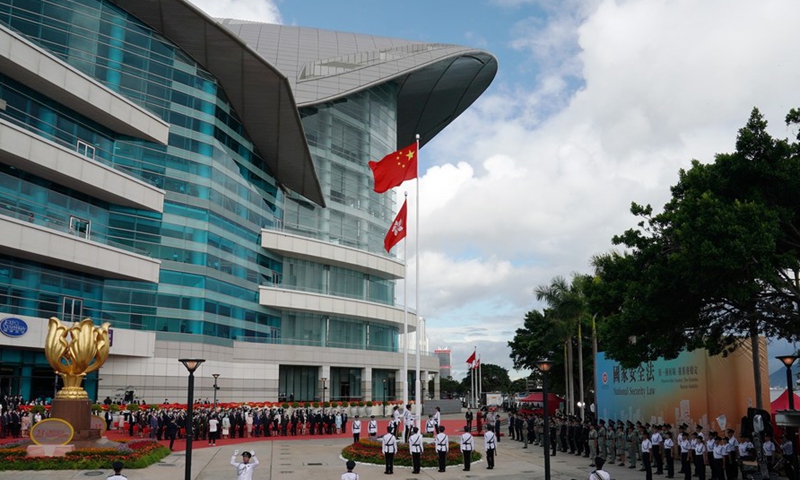Official denies national security law treats HK as “one country, one system”
Source:Global Times Published: 2020/7/1 15:08:40

A flag-raising ceremony is held at the Golden Bauhinia Square to celebrate the 23rd anniversary of Hong Kong's return to the motherland, in Hong Kong, south China, July 1, 2020. (Xinhua/Li Gang)
The national security law for Hong Kong perfectly combines the "one country" principle with respect for the differences in the "two systems," said Zhang Xiaoming, deputy director of the Hong Kong and Macao Affairs Office of the State Council, denying that the law violates "one country, two systems."
"If we are going to have 'one country, one system' as claimed by some Western politicians, we could just directly apply the criminal law and other national laws to Hong Kong. Why go through so much trouble to tailor a national security law specifically for Hong Kong?" Zhang said at Wednesday's press conference held in Beijing.
Some countries are threatening to sanction Chinese officials, I believe this is the logic of bandits, Zhang said. He said that some Americans stretched their hand too far, and as long as the US intervenes, the Chinese government and the Hong Kong government are bound to counter it.
Zhang, who sees the national security law as a birthday gift to Hong Kong on the 23rd anniversary of the establishment of the Hong Kong Special Administrative Region (HKSAR), said the future will reveal the law's precious value.
Some people say that the enactment of the national security law is aimed at preventing opposition forces from being elected to the Legislative Council. Such speculation makes our legislative purpose too utilitarian and short-sighted, Zhang said.
The national security law for Hong Kong does not treat the whole pan-democracy camp in Hong Kong as an enemy, and targets only a few people, and not the entire opposition force, Zhang said.
In explaining article 60 of the law, which says that acts performed in the course of duty by the Office for Safeguarding National Security of the central government in the HKSAR and its staff in accordance with this law shall not be subject to the jurisdiction of the HKSAR, Zhang said that the power exercised by the national security office in Hong Kong goes beyond the autonomy of the HKSAR, and no local organs in Hong Kong have jurisdiction over the office.
As for whether criminal suspects in Hong Kong will be sent to the Chinese mainland for trial, Zhang explained that the central government and HKSAR will have two different law enforcement and judicial teams, and different systems for filing cases, investigation, trial and sentencing, which will jointly form the mechanism to safeguard national security for Hong Kong. According to Legislation Law, lawmakers can vote draft laws for those where consensus is reached after two readings, and national security law for Hong Kong went through two readings before enactment, Shen Chunyao, head of the Legislative Affairs Commission of National People's Congress (NPC) Standing Committee, said at Wednesday's media briefing.
Chinese authorities did not publish the full text of the draft national security law for opinions from society due to the law's sensitivity, but sought opinions from related parties through multiple channels, especially from Hong Kong representatives, Shen said.
According to the Legislation Law, the chairman of the NPC Standing Committee can decide which draft laws to not make public.
The law came into force at 11 pm local time on Tuesday.
RELATED ARTICLES:
Posted in: SOCIETY,HK/MACAO/TAIWAN